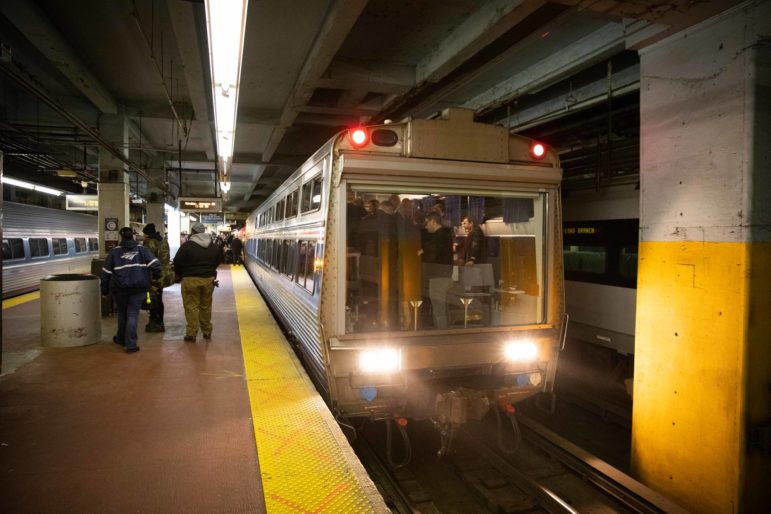“Instead of continuing to overburden already disadvantaged communities, we can bring freight rail through Gateway to a new distribution hub at Moynihan/Penn Station, which is already equipped with loading bays from its previous use as a postal facility.”

Edwin J. Torres/ NJ Governor’s Office.
The Gateway Program will include the construction of a new Hudson Tunnel linking NJ and NY.Recently, officials broke ground on the first major piece of the Gateway project, which aims to modernize and double rail capacity between New York and New Jersey. Shortly after that, the MTA released details of its congestion pricing plan.
Both are worthy goals that will improve air quality, passenger rail access, and the regional and national economy. But the climate crisis requires us to be more ambitious and innovative in how we transport goods. Right now, officials are missing a critical opportunity to take advantage of these initiatives to help tackle this issue: Designing Gateway’s tunnels to accommodate freight rail would eliminate thousands of trucks from city streets.
New York is unable to handle freight deliveries and with growing demand for online orders, it is only getting worse. Almost 90 percent of goods are transported around New York by truck and the subsequent congestion delays cost New York City $862 million in lost economic activity. The MTA’s environmental assessment on congestion pricing points to an increase of trucks on the Cross Bronx Expressway. The proliferation of last-mile distribution centers being built to keep up with increased online orders will bring more truck traffic, disproportionately affecting neighborhoods of color like Sunset Park, Red Hook, and parts of the Bronx.
This is why, in 2021, the NYC City Council passed Local Law 166, requiring NYCDOT to “learn about opportunities and challenges to using micro-distribution centers for deliveries in the city.”
Instead of continuing to overburden already disadvantaged communities, we can bring freight rail through Gateway to a new distribution hub at Moynihan/Penn Station, which is already equipped with loading bays from its previous use as a postal facility. The Penn Station Improvement Project should be designed to include a consolidation and distribution facility for goods traveling by rail and then delivered to customers by smaller, safer, zero-emission vehicles (including cargo bikes).
There have been many proposals for freight rail crossing the Hudson, but none have received traction like The Cross Harbor Freight Program, a long-studied proposal to create a freight rail tunnel between New Jersey and Brooklyn that is championed by Congressman Jerry Nadler.
But Cross Harbor has many critics, including transportation professionals and communities already bearing the brunt of freight uses. And, with an estimated $10 billion price tag, it remains unapproved and unfunded.
Its goals can be achieved quicker and cheaper by adding a freight component to the yet-to-be-built Gateway project. Due to redistricting, if Congressman Nadler wins the upcoming election, his new district will actually include Moynihan/Penn Station and not the proposed Cross Harbor boundaries. Hopefully his advocacy for freight improvements can continue with his support for this project instead.
Our climate crisis and freight demands mean we can’t wait for multiple rail projects to solve these issues. Turning the Gateway in the “Freightway” would ensure a future with a cleaner climate, reduced congestion, and safer streets.
Sandra Rothbard, AICP is an urban planner and global expert in city logistics. She founded Freight Matters, a consulting firm that works with municipalities, nonprofits, and the private sector on improving the sustainability, resilience and efficiency of last-mile deliveries.








One thought on “Opinion: Gateway Must Become ‘Freightway’ to Reduce Congestion and Meet Our Climate Goals”
I am a railroad industry professional and have been advocating more freight use of the New York Penn Station route for years. I spent 21 years with Amtrak and then retired and completed a MA in Transportation Policy, Operations and Logistics.
If Ms Rothbard would contact me I would be happy and pleased to discuss her excellent proposal in further detail.